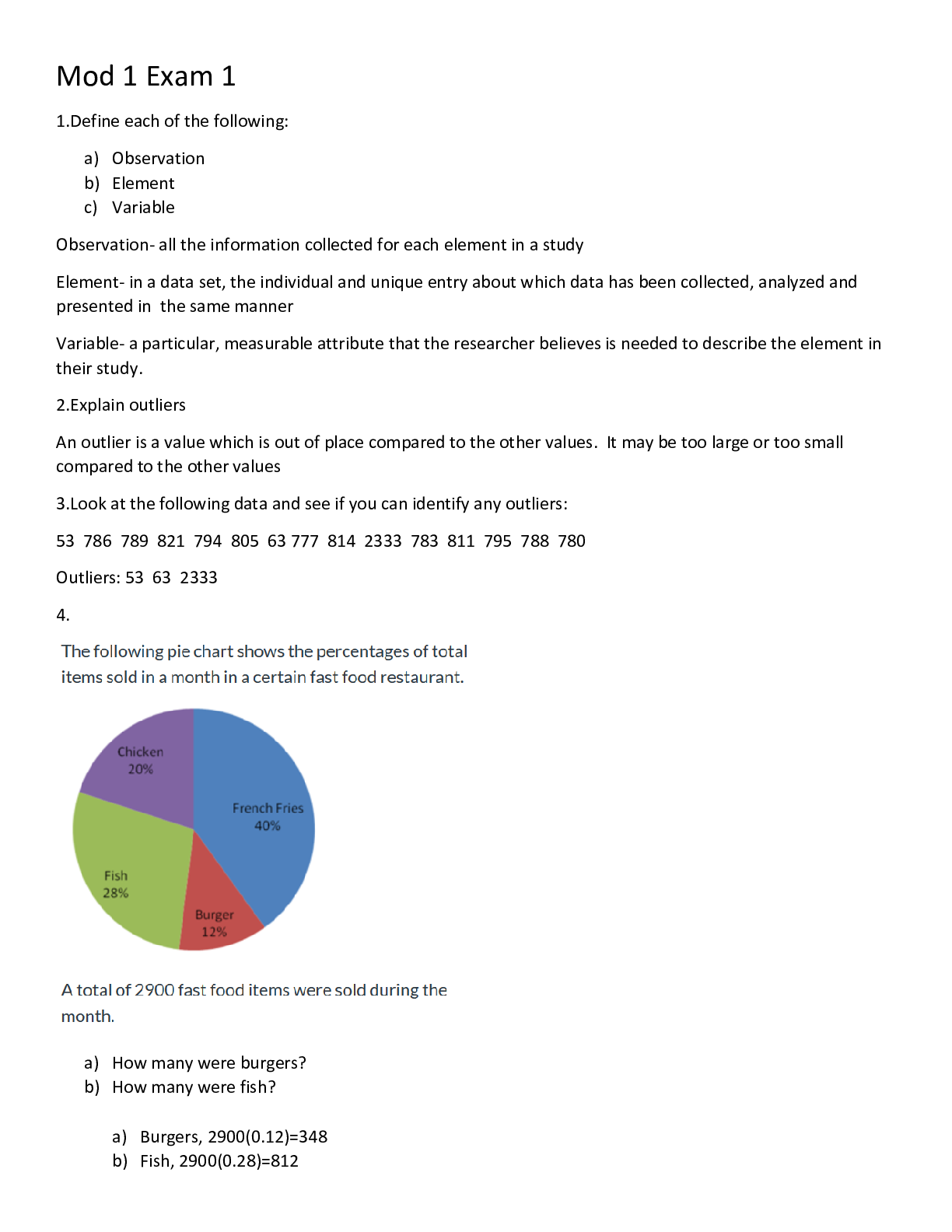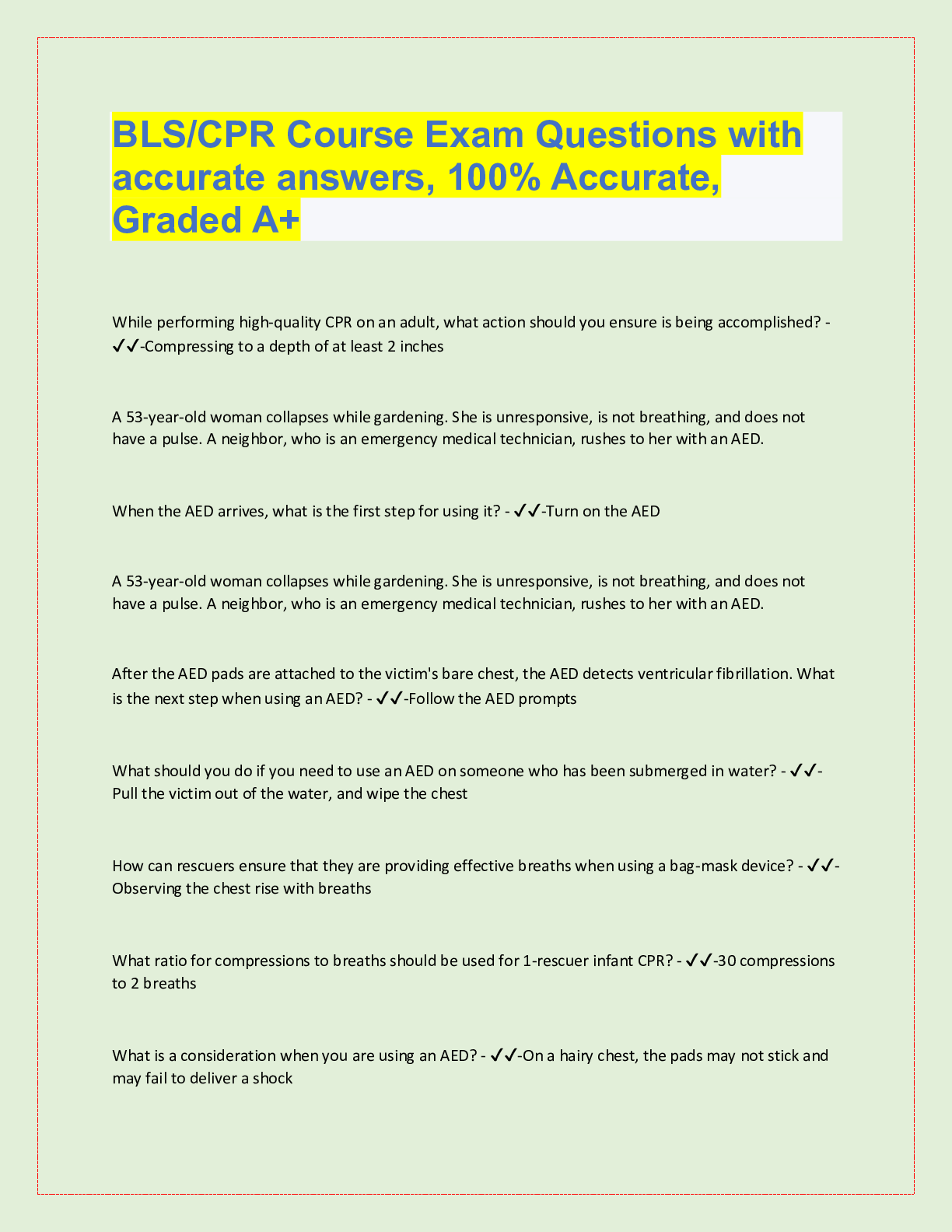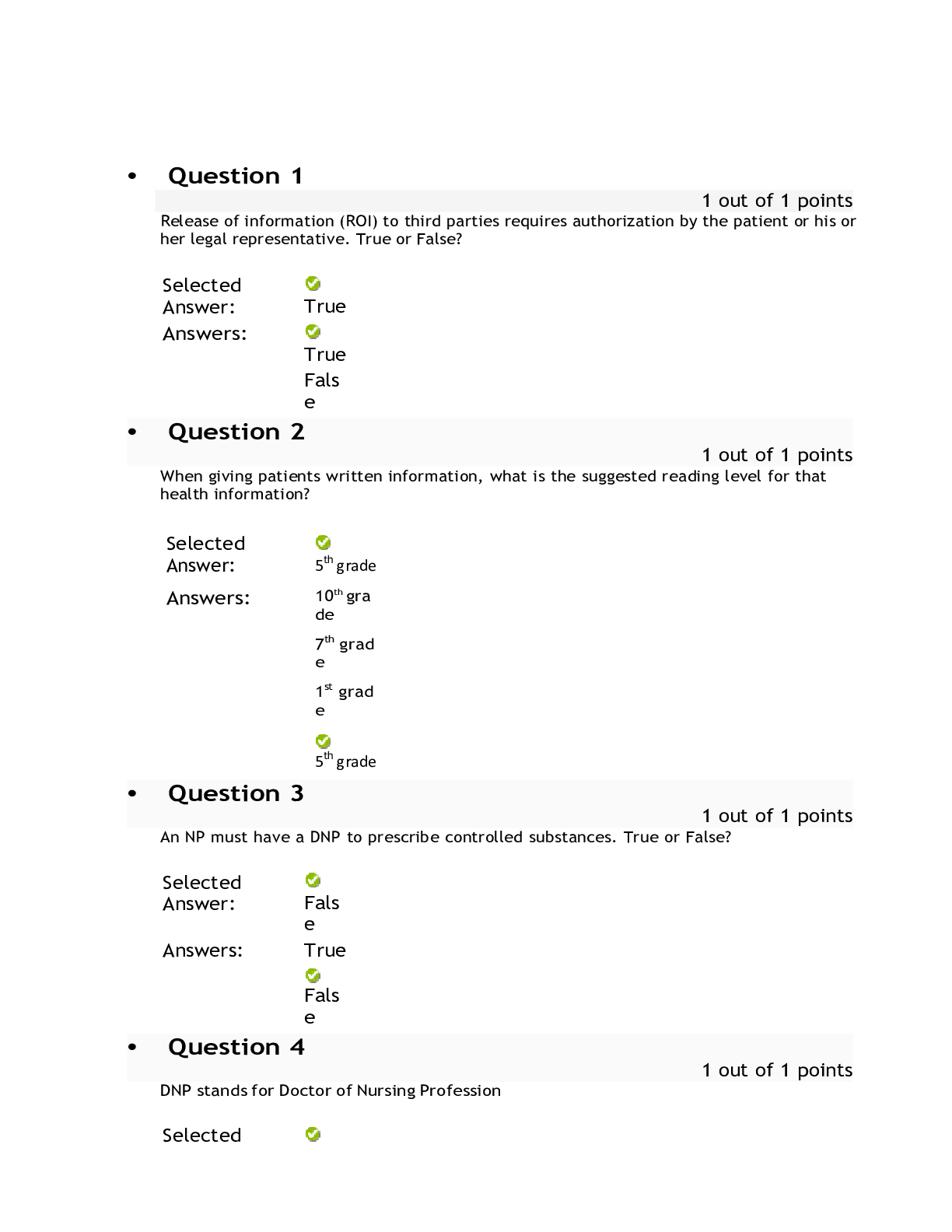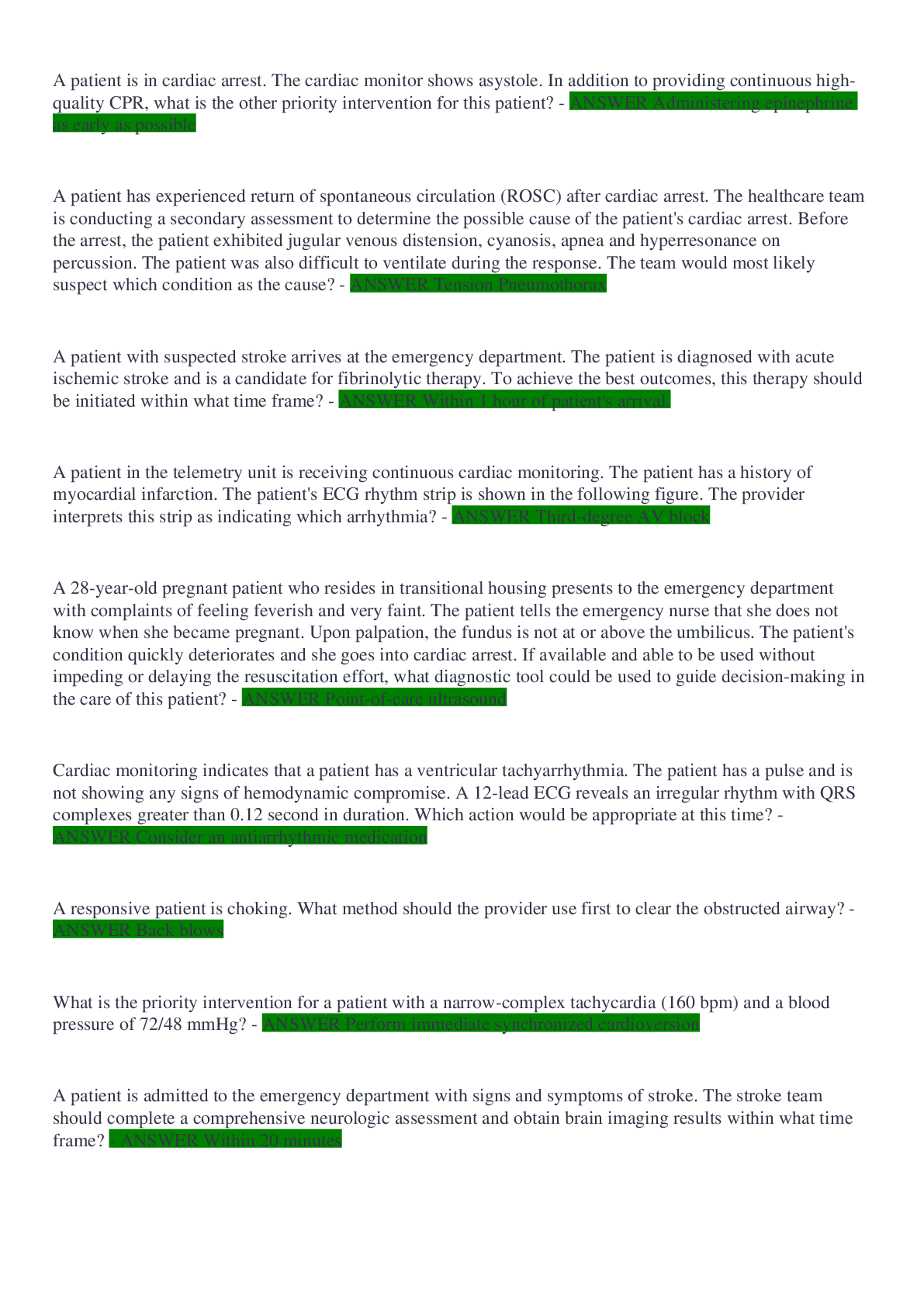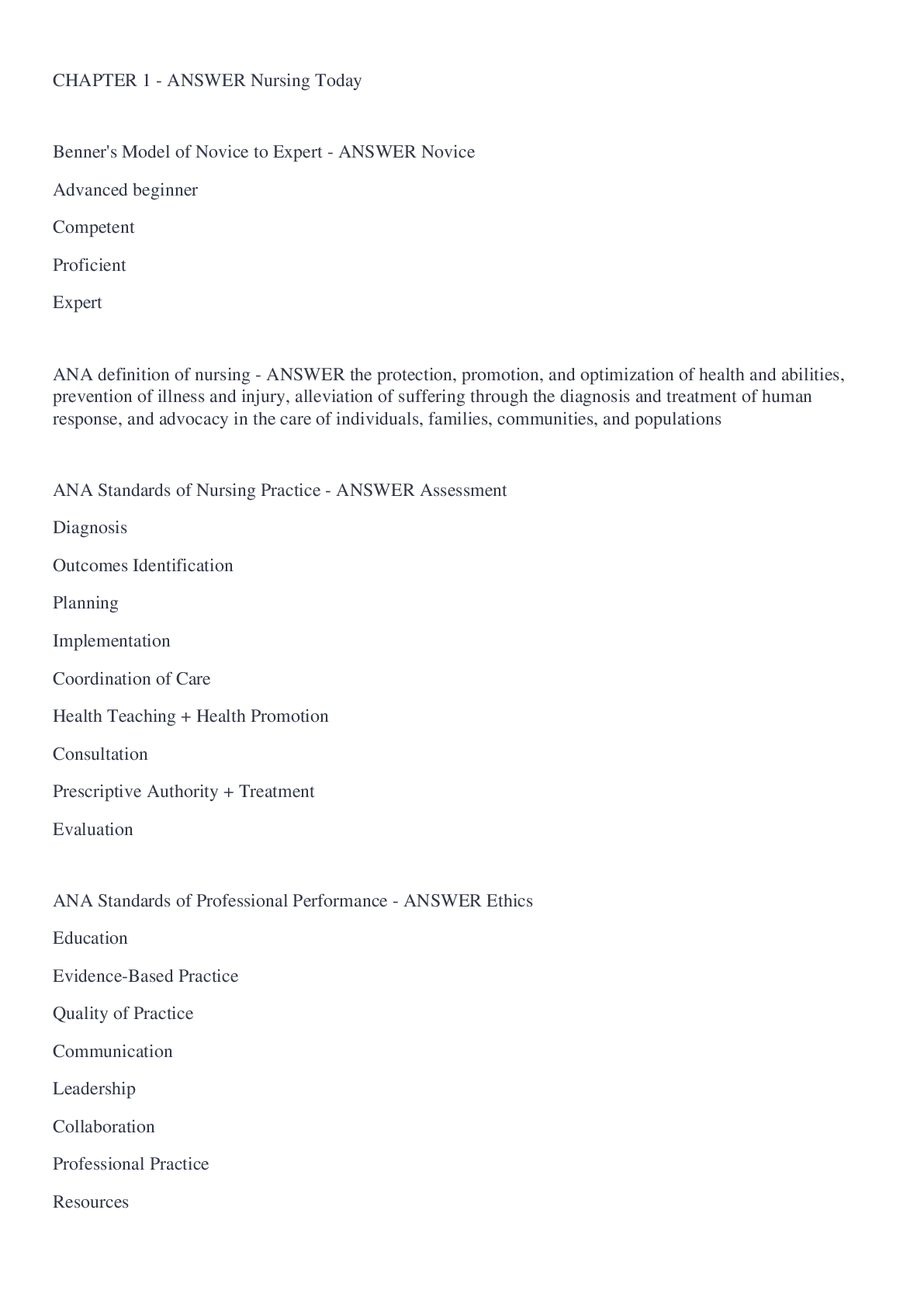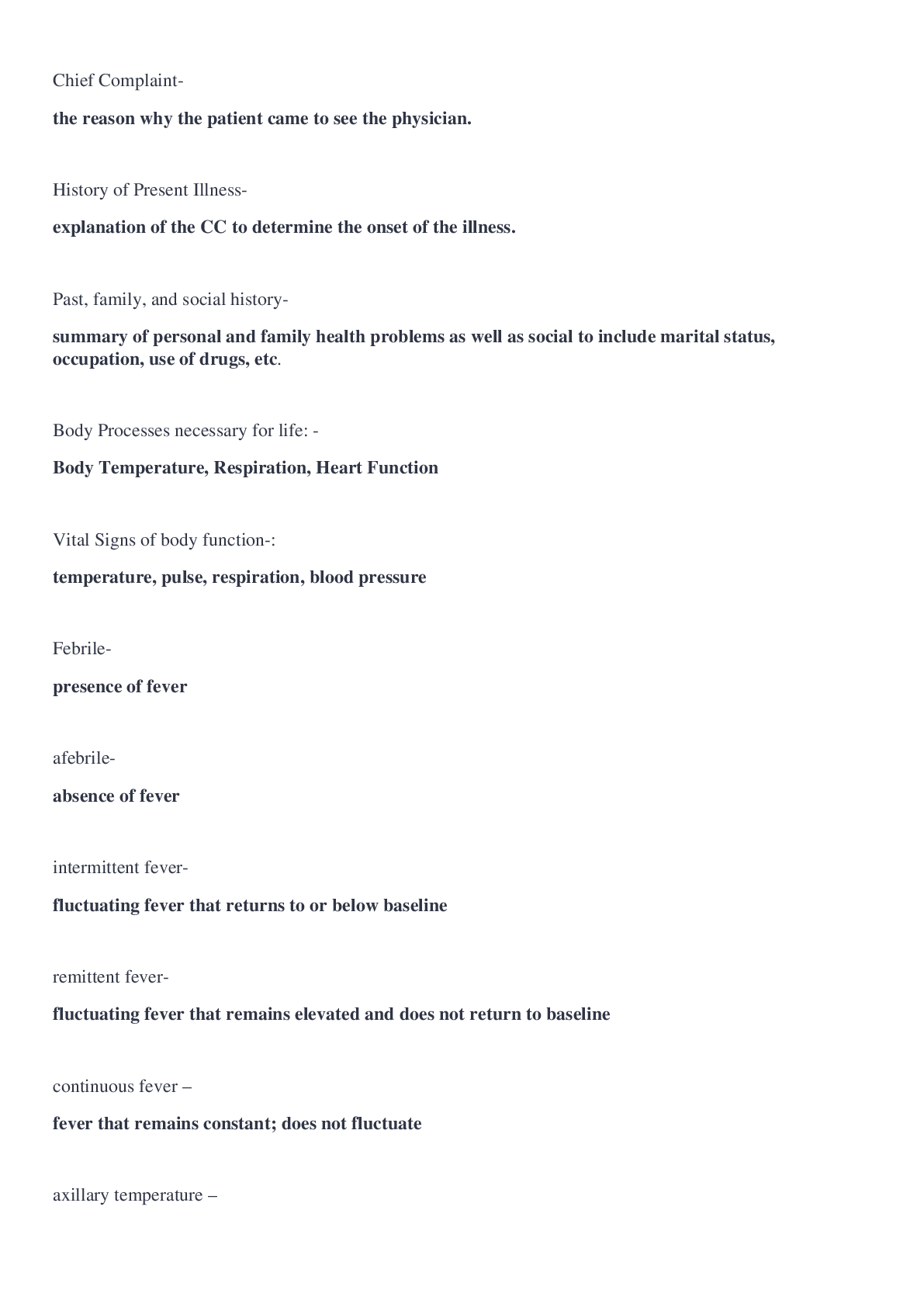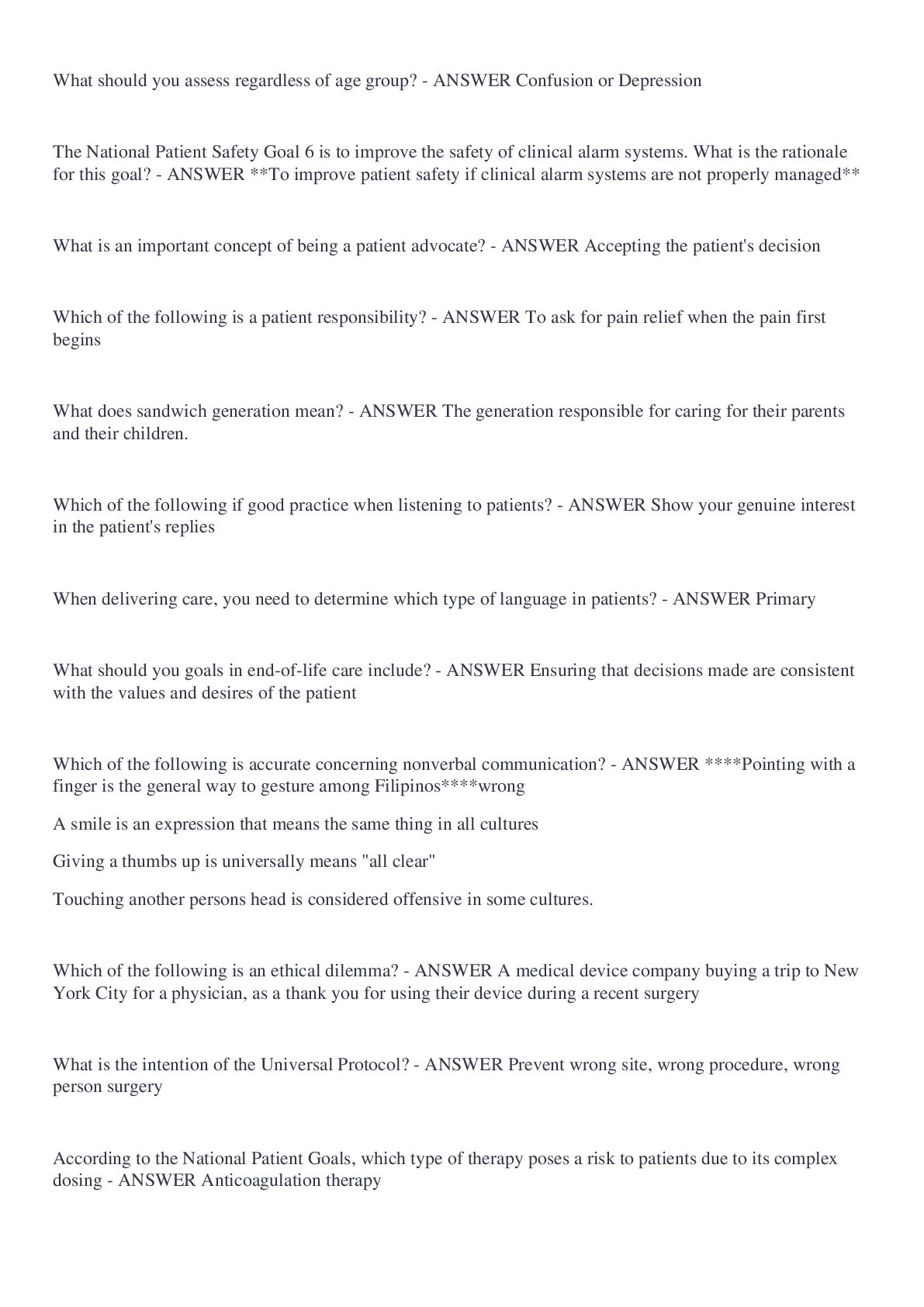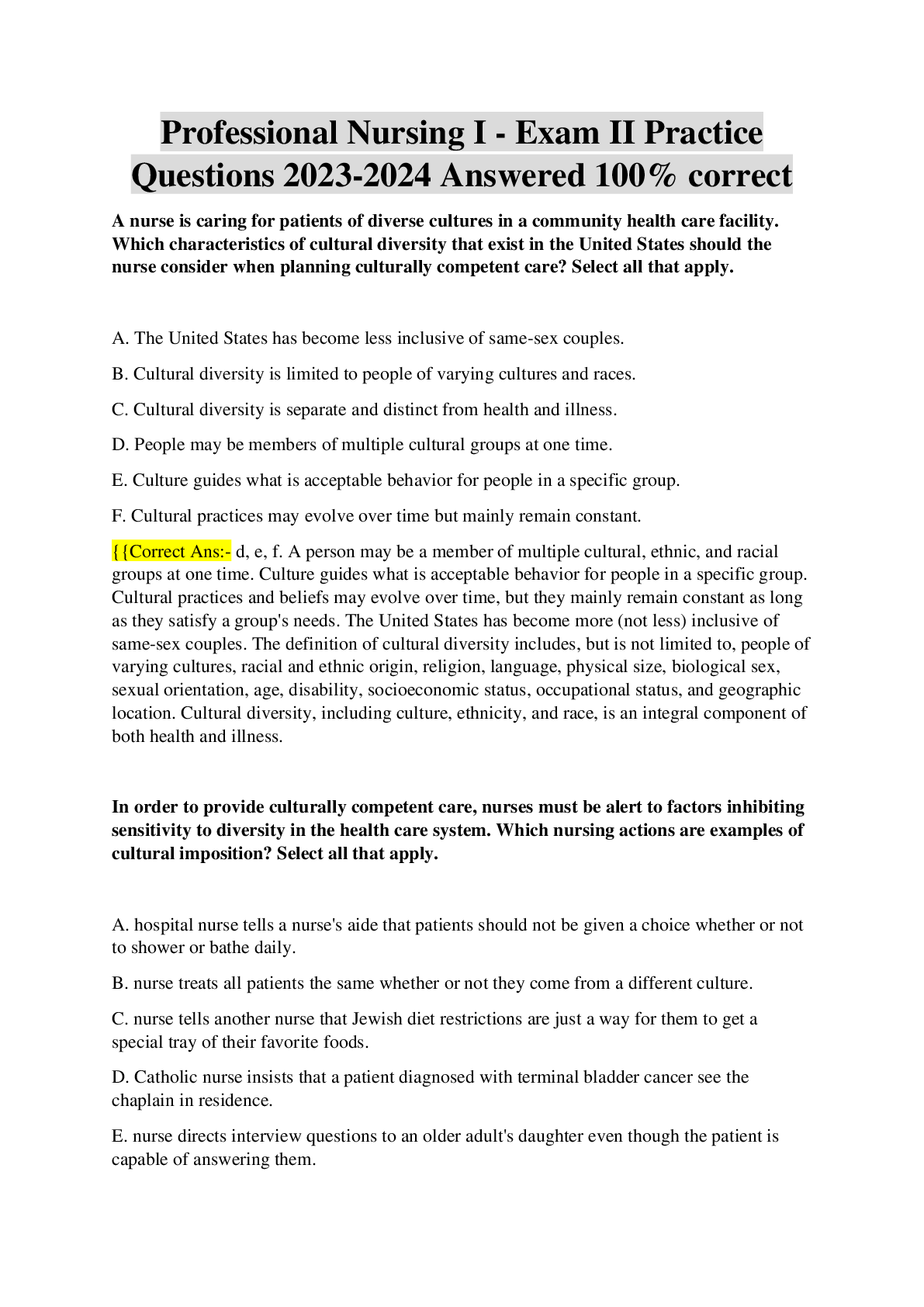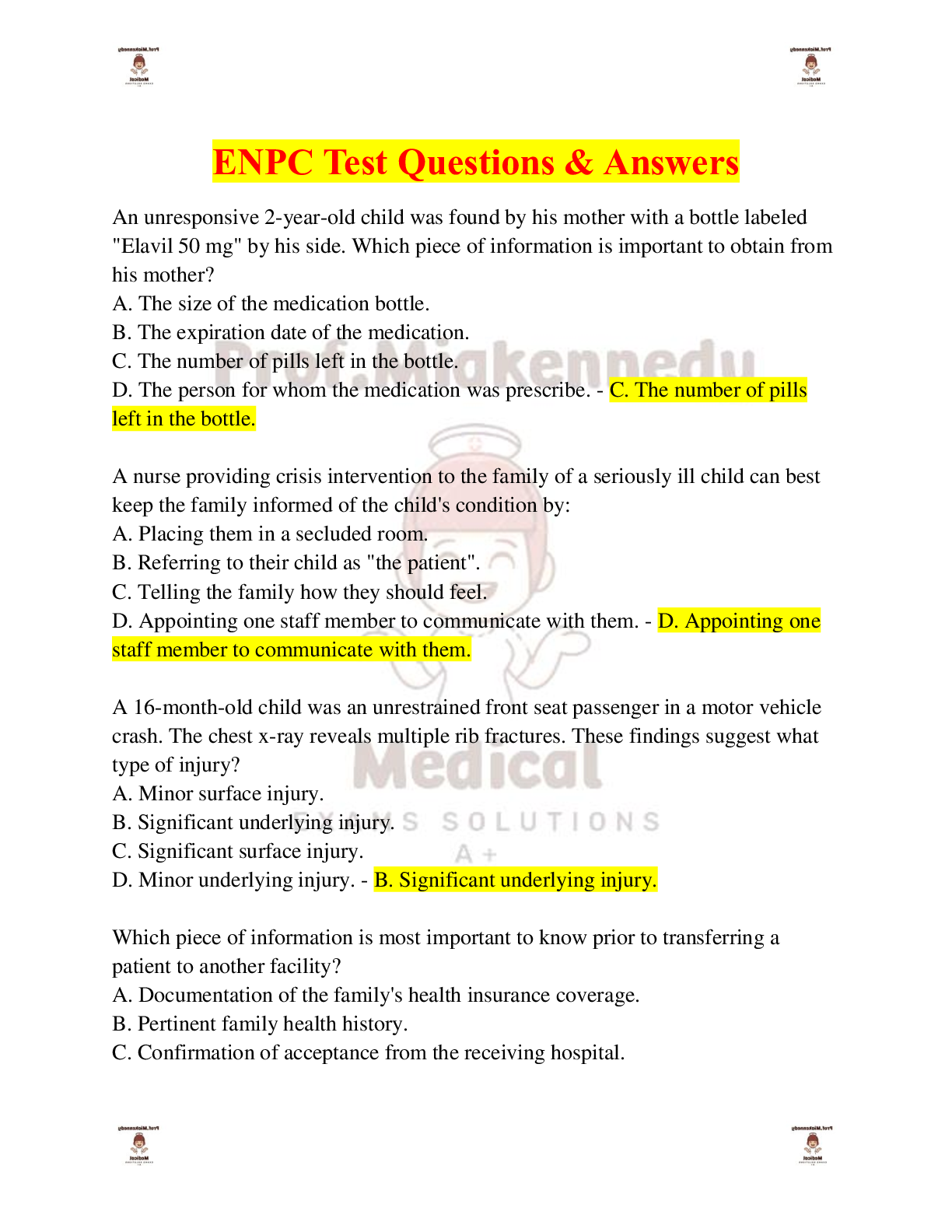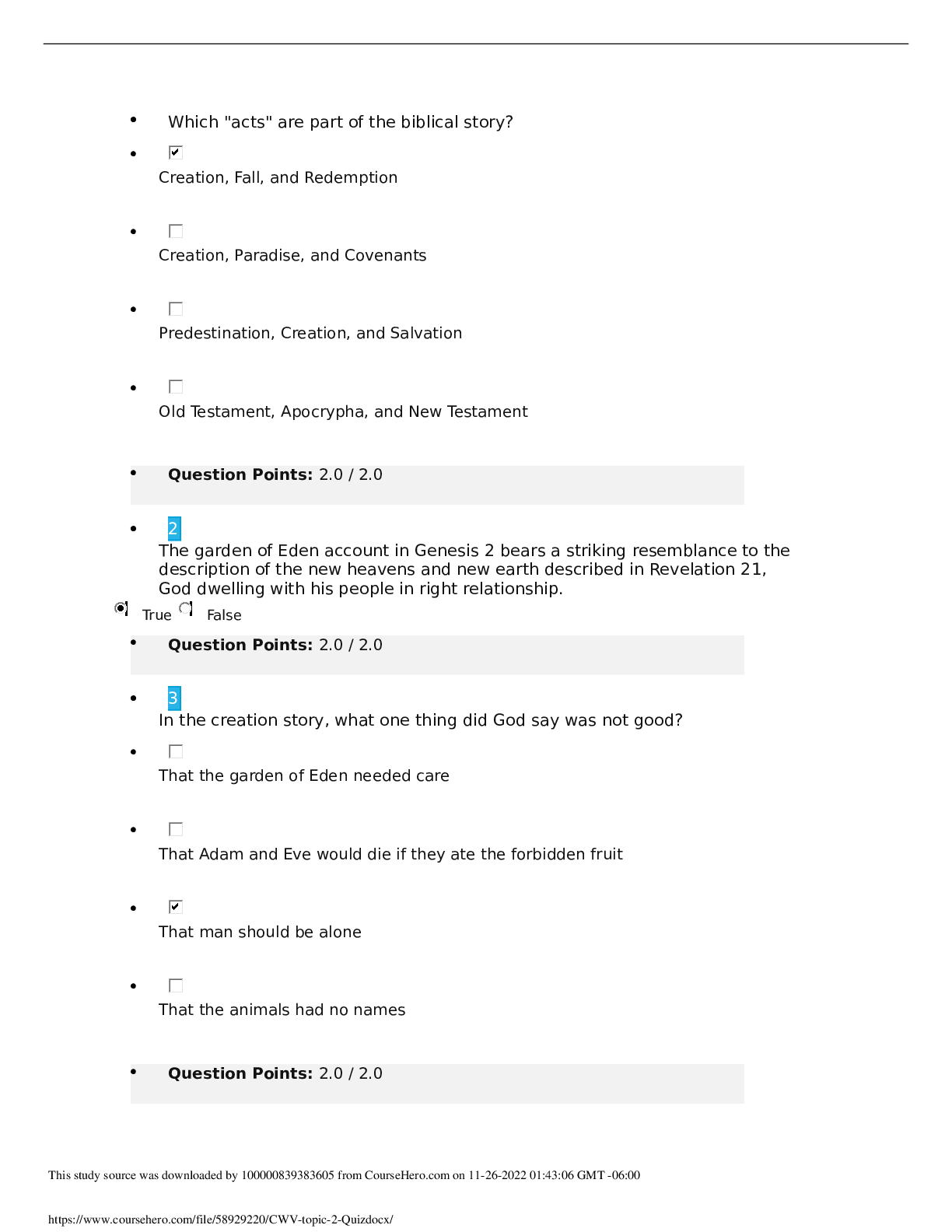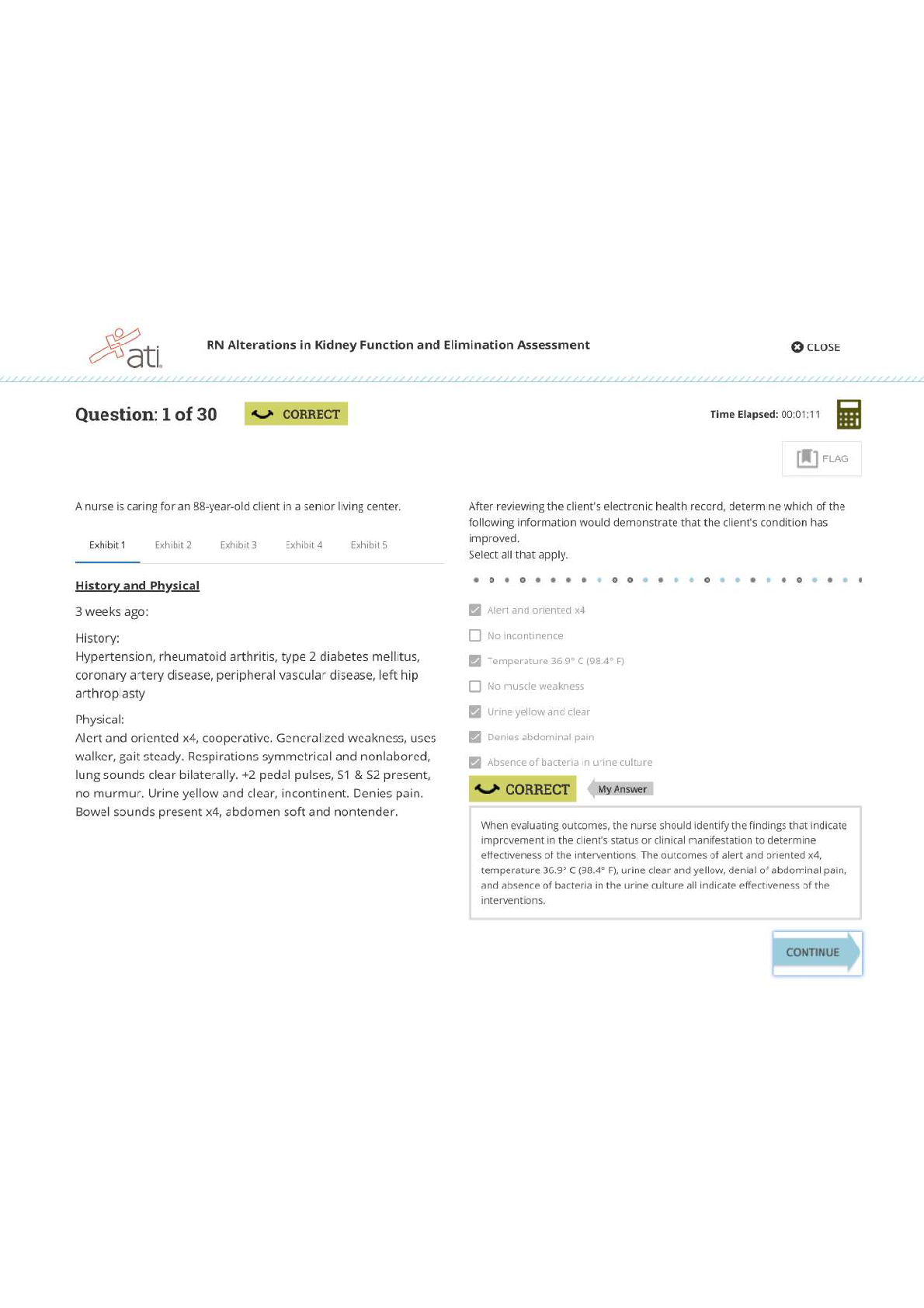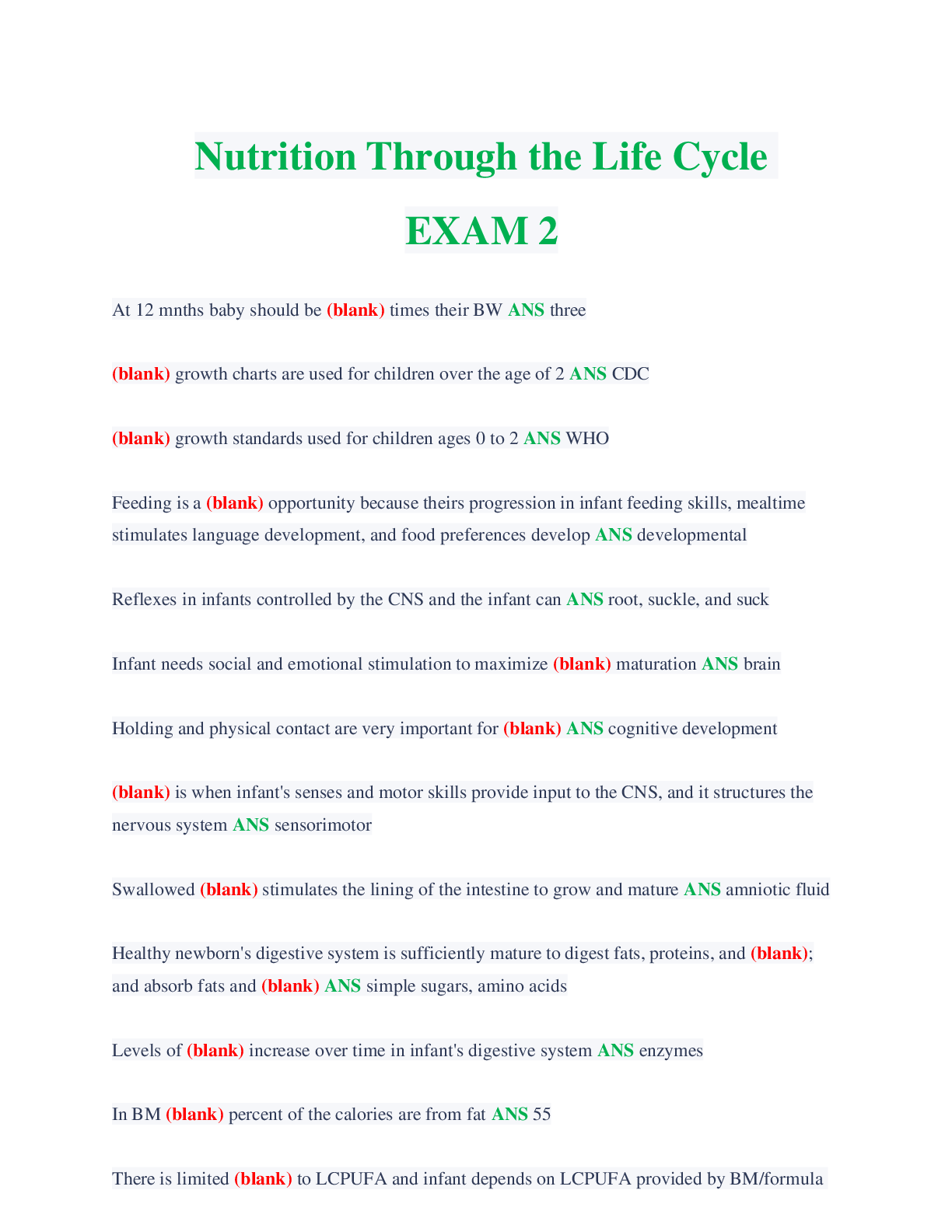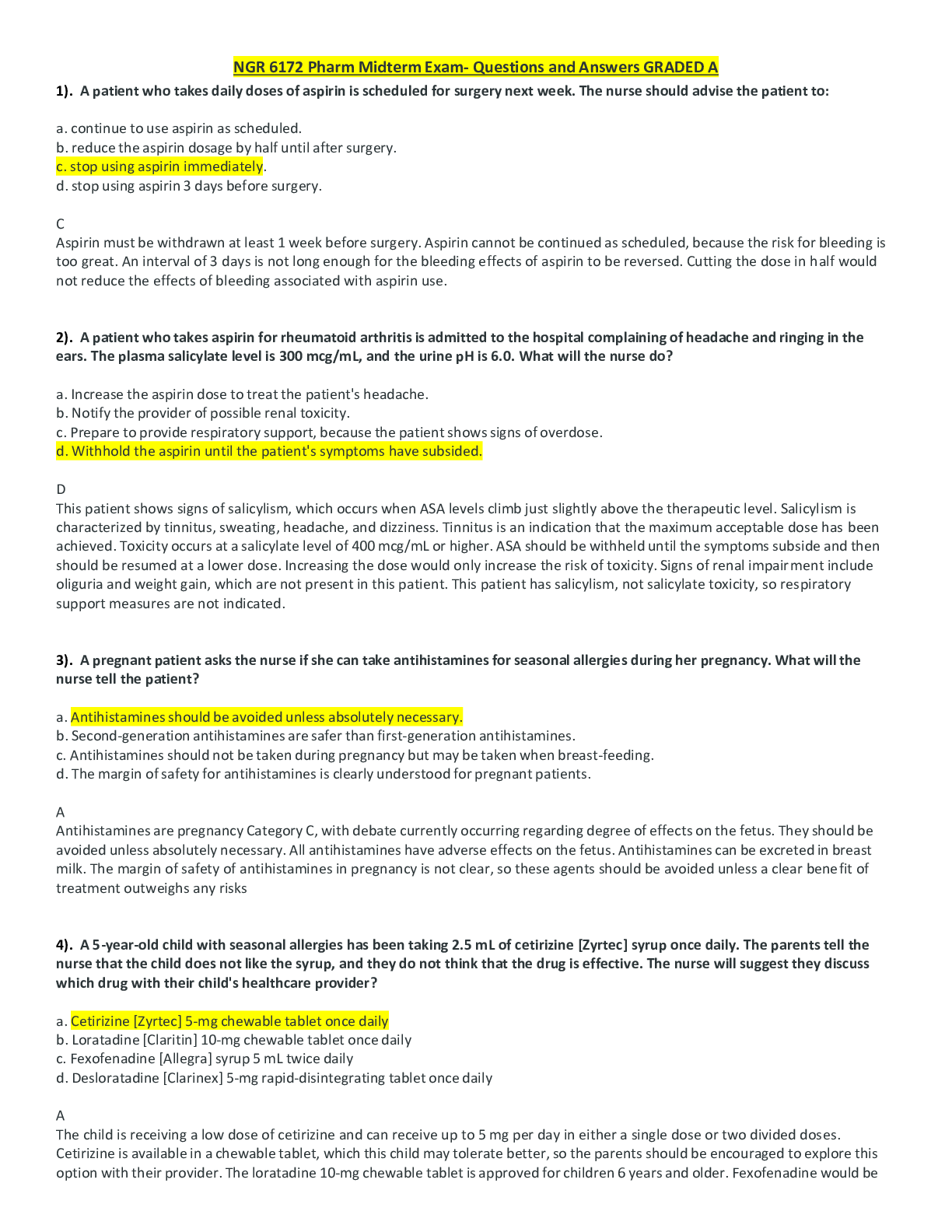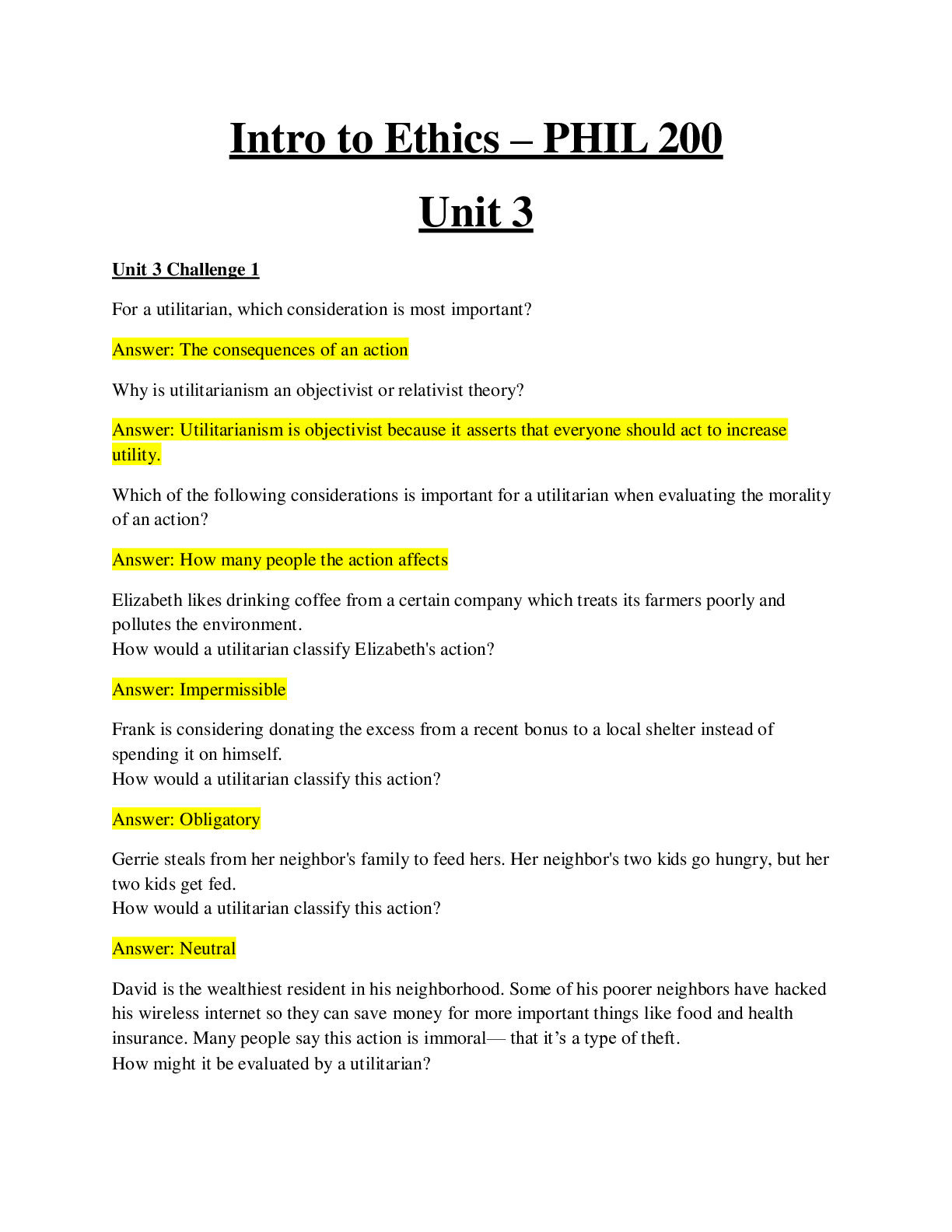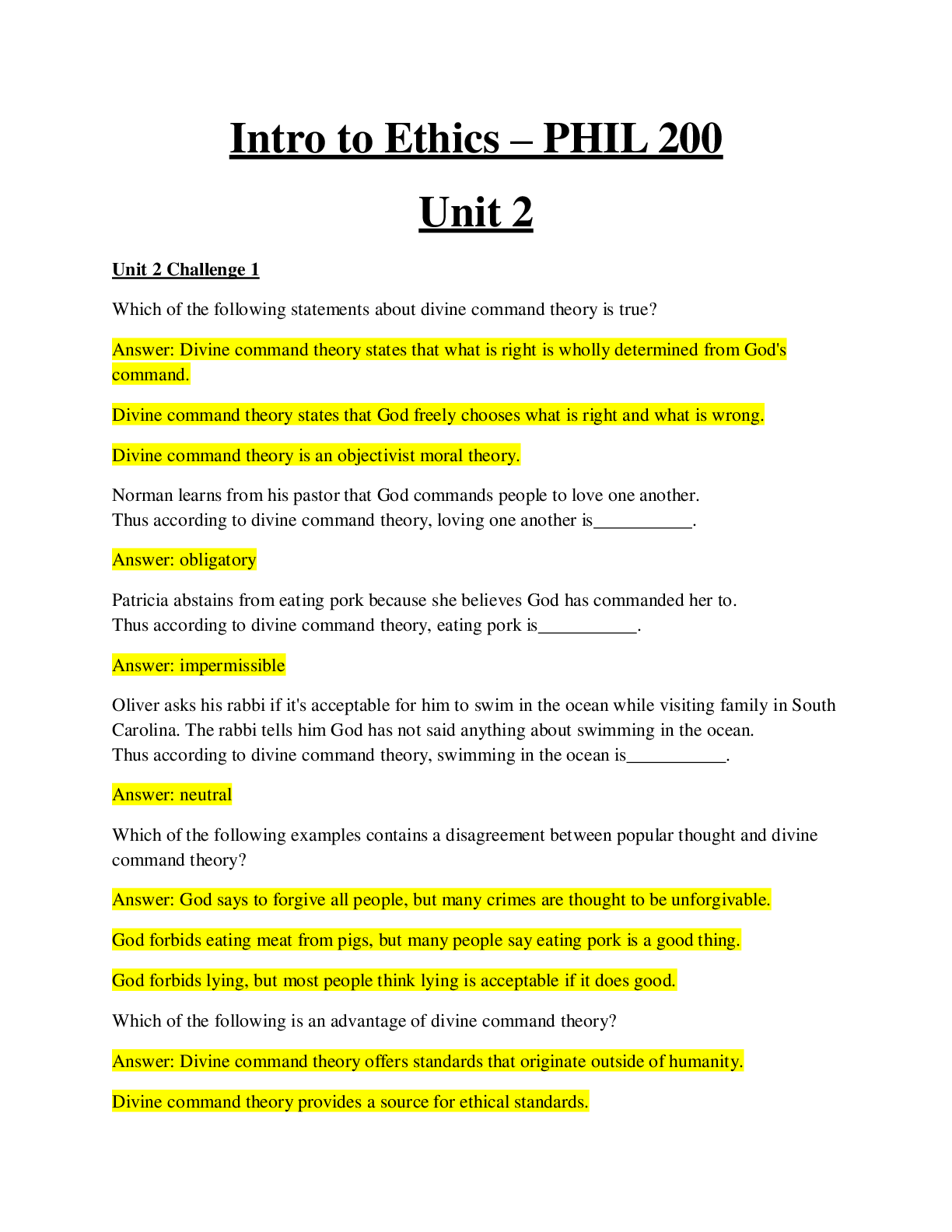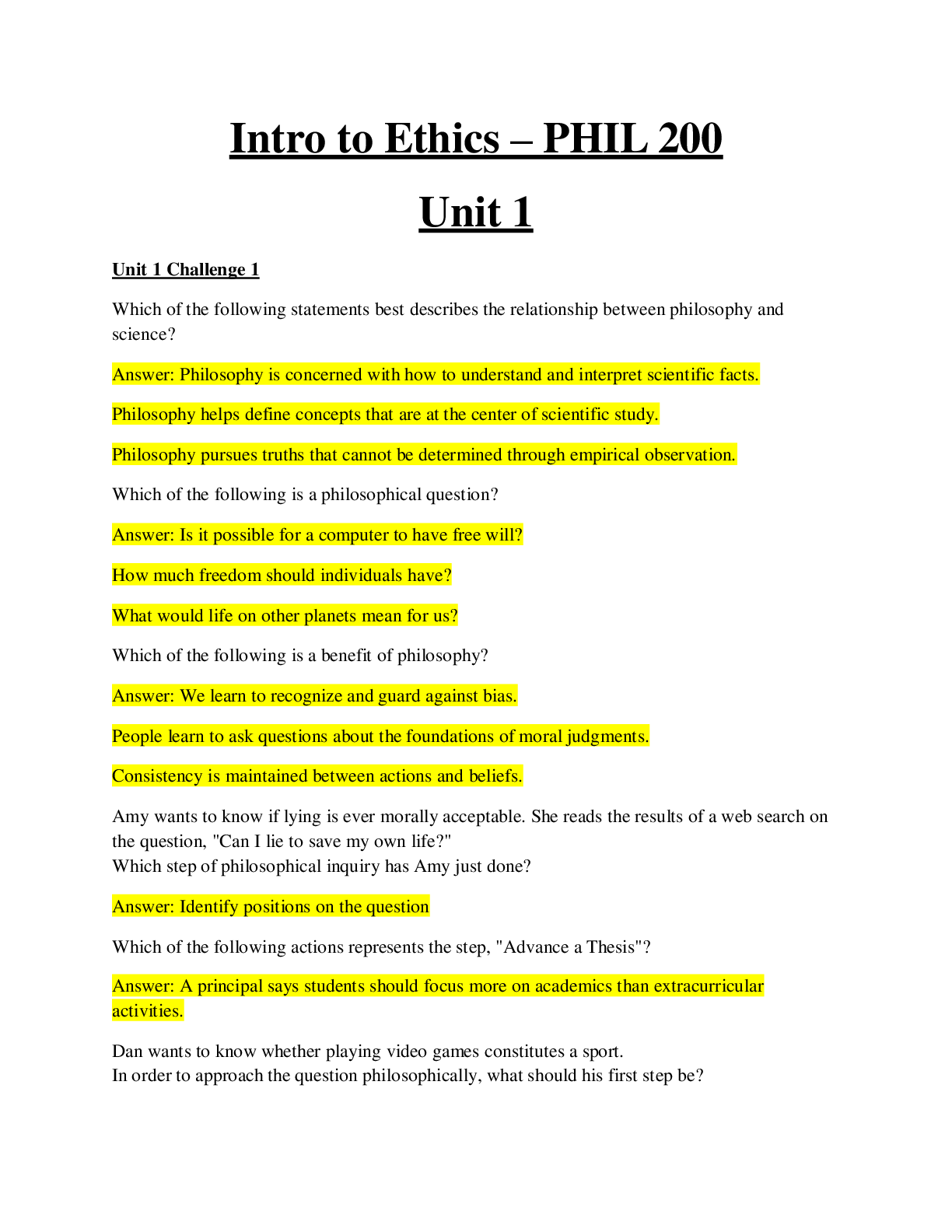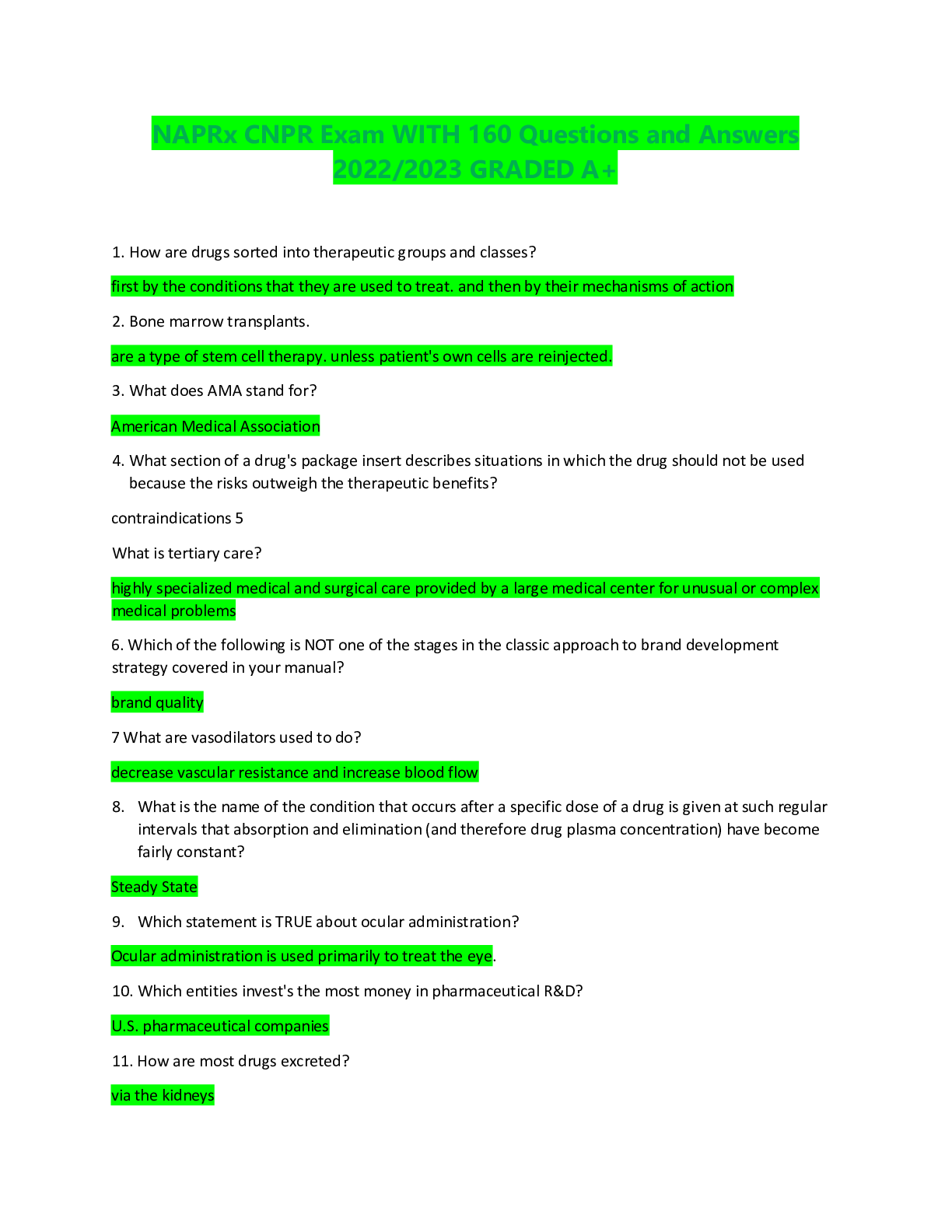Social Sciences > EXAM > Psychology Test 4 Answered 100% (All)
Psychology Test 4 Answered 100%
Document Content and Description Below
Phonemes - ANSWER The basic units of sound that can change the meaning of a word. Morphemes - ANSWER The basic units of meaning that exist in a word. Syntax - ANSWER Rules specifying how words c... an be combined to form meaningful sentences in a language Semantics - ANSWER The aspect of language centered on meanings. Think of deeper meanings when words are placed together, like "Sherry was green with jealousy", think beyond the meanings of each individual word, and think what it means in that sentence. Pragmatics - ANSWER Rules specifying how language is to be used appropriately in different social contexts to achieve goals. Have to learn when to say what to whom. Prosody - ANSWER The melody or sound pattern of speech, including intonation, stress, and timing with which something is said Who has a nativist theory and view of Language development? - ANSWER Noam Chomsky Who has a nurture theory for Language Development and what is it - ANSWER Skinner Shaping sounds into words, parents repeat words(association), reinforce imitation, use frames. Not the best theory Chomsky's nativist theory of language development - ANSWER Focus on the role of the child's biologically programmed capacities to acquire language. Chomsky proposed that humans have a unique genetic capacity to learn language. Humans are equipped with knowledge of a universal grammar, which provides the framework for acquiring a language, but is not language specific. Exposure to language activates the areas of the brain collectively called the Language Acquisition Device(LAD). Universal Grammar - ANSWER A system of common rules and properties for learning any of the world's languages. It offers a limited number of possibilities for forming language. According to nativist view, humans are equipped with this knowledge. Language Acquisition Device (LAD) - ANSWER A set of linguistic processing skills that nativists believe to be innate, presumably it enables a child to infer the rules governing others' speech and then use these rules to produce language. Exposure to language activates this part of the brain. It is a brain function that sifts through language, applies the universal rules, and begins tailoring the system to the specifics of the language spoken in the young child's environment. Evidence that supports Chomsky's Nativist View - ANSWER 1. The poverty of the stimulus, a term for the notion that language input to young children is so impoverished or limited that they could not possibly acquire language without a powerful innate language acquisition device. 2. Children all progress through the same sequences at roughly similar ages, and they even make the same kinds of errors, which suggests that language development is guided by a species-wide maturational plan. 3.These universal aspects of early language development occur despite cultural differences in the styles of speech that adults use in talking to young children. Also the idea of learning a second-language Language Acquisition in Deaf Children - ANSWER Many deaf children gain their first exposure to language by learning a sign language, which is a true language. If deaf babies have deaf parents and see them signing, they learn that language just as babies learn their native language. Also, deaf babies can babble in sign language. Deaf mothers communicate using "child-directed signs", like child-directed speech. Babies are born ready to learn any language, whether it be spoken or signed. Nurture view, learning theory perspective on language development - ANSWER Children learn the words they hear spoken by others, even when the words arent spoken directly to them. These theorists have an easier time explaining the development of phonology and semantics than accounting for how rules of syntax are acquired. A mother's approval or disapproval depended on the truth value or semantics of what was said, not the grammatical correctness of the statement. Young children frequently imitate other people's speech and this may help them get to the point if producing new structures. Children are more likely to start using a new word if they are reinforced for doing so. Nature and Nurture working together to describe learning acquisition - ANSWER Interactionists believe that both learning theorists(nurture) and nativists(nature) are correct: Children's biologically based competencies and their language environment interact to shape the course of language development. They emphasize that acquisition of language skills depends on and is related to the acquisition of many other capacities: perceptual, cognitive, motor, social, and emotional. They point out that the capacity for acquiring language is not unique, but interrelated to other developments that are taking place concurrently with language acquisition. Interactionists argue that language development depends on the maturation of cognitive abilities such as the capacity for symbolic thought. However, interactionist position also emphasizes ways in which social interactions with adults contribute to cognitive and linguisitc development Expansion - ANSWER A conversational tactic used by adults in speaking to young children in which they respond to a child's utterance with a more grammatically complete expression of the same thought. Adults use these techniques mainly to improve communication, not to teach grammar. Child-directed Speech - ANSWER Speech used by adults speaking with young children, it involves short, simple sentences spoken slowly and in a high-pitched voice, often with much repetition and with exaggerated emphasis on key words. They do this to try to facilitate acquisition of new language skills. Word segmentation - ANSWER The ability to break the stream of speech sounds into distinct words. At 7 1/2 months infants get this ability, they detect a target word in a stream of speech Cooing - ANSWER An early form of vocalization that involves repeating vowel-like sounds. 6-8 weeks of age. "ooohh" and "aaah" Babbling - ANSWER An early form of vocalization that appears between 4 and 6 months of age and involves repeating consonant-vowel combinations such as "baba" or "dadada". The repeating of an interesting noise for the pleasure of making it Comprehension vs production - ANSWER As they attempt to master the semantics of language, infants come to understand many words before they can produce them. That is, comprehension(reception) is ahead of production(or expression) in language development. 10 months old can comprehend about 50 words, but can't produce them yet. This gap between comprehension and production persists and may reflect the relative importance of understanding speech over producing speech Holophrases - ANSWER A single-word utterance used by an infant that represents an entire sentence's worth of meaning. It is usually an infant's first meaningful word, around 1 year of age Vocabulary Spurt - ANSWER A phenomenon occurring around 18 months of age when the pace of word learning quickens dramatically. A new word is acquired every 2 hours during this time. Overextension - ANSWER The young child's tendency to use a word to refer to a wider set of objects, actions, o events than adults do (using the word car to refer to all motor vehicles) Underextension - ANSWER The young child's tendency to use general words to refer to a smaller set of objects, actions, or events than adults do (using the word candy to refer only to mints) Telegraphic Speech - ANSWER Early sentences that consist primarily of content words and omit the less meaningful parts of speech such as articles, prepositions, pronouns, and auxiliary verbs. 18-24 months. Early combinations of 2, 3, or more words Overregularization - ANSWER The overgeneralization of observed grammatical rules to irregular causes to which the rules do not apply (saying mouses instead of mice) Mastery Motivation - ANSWER An intrinsic motive to master and control the environment evident early in infancy. It appears to be inborn and universal and will display itself in the behavior of all typical infants without prompting from parents. Is Baby Einstein beneficial? - ANSWER Not as beneficial as we thought. It was found that for each hour spent watching videos, babies understood 6-8 fewer words than babies who did not watch videos. There were absolutely no differences in vocabulary knowledge or language development Head Start - ANSWER The idea behind this program was to provide a variety of social and intellectual experiences that might better prepare disadvantaged children for school and "break the cycle of poverty". At first, it seemed to be a big success, but unfortunately these early gains were completely wiped out by the time children reached second or third grade The Abecedarian Project - ANSWER A full time educational program from infancy to age 5, for children from low-come income families.Children in this program showed impressive cognitive gains during and immediately after the program. This program was the more successful of the two in terms of later in life. Got more college degrees. Still didn't fix everything though, because there were still similar amounts of criminal activity. Mastery Goals - ANSWER In achievement situations, aiming to learn new things in order to learn or improve ability. Also called learning goals Performance Goals - ANSWER A goal adopted by learners in which they attempt to prove their ability rather than to improve it. Seek to be judged smart rather than dumb Emergent Literacy - ANSWER The developmental precursors of reading skills in young children, including knowledge, skills, and attributes that will facilitate the acquisition of reading competence. False Belief Task - ANSWER A research paradigm used to assess an important aspect of a theory of mind, mainly the understanding that people can hold incorrect beliefs and be influenced with them. Theory of Mind - ANSWER The understanding that people have mental states (feelings, desires, beliefs, intentions), and that these states underlie and help explain their behavior. Children who pass the false belief task show evidence of having this. Perspective-taking skills - ANSWER The ability to assume other people's perspectives and understand their thoughts, feelings, and behaviors; roletaking skills. These abilities develop in a stagelike manner as children progress through Piaget's stages of cognitive development [Show More]
Last updated: 1 year ago
Preview 1 out of 7 pages
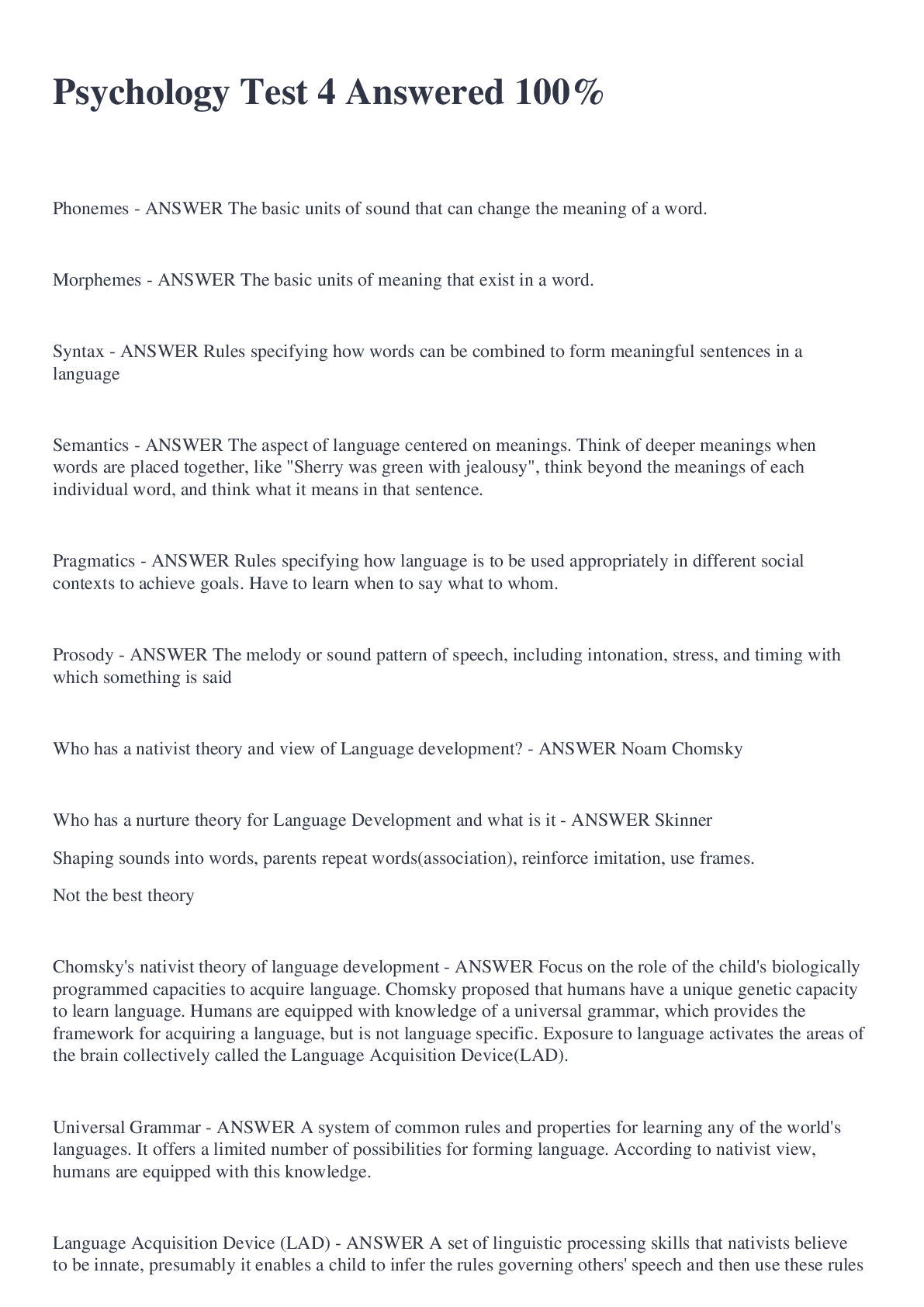
Reviews( 0 )
Document information
Connected school, study & course
About the document
Uploaded On
Nov 21, 2022
Number of pages
7
Written in
Additional information
This document has been written for:
Uploaded
Nov 21, 2022
Downloads
0
Views
39

